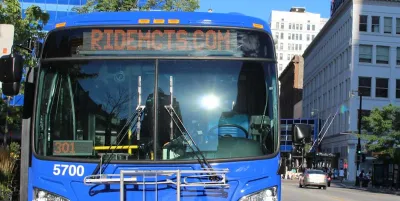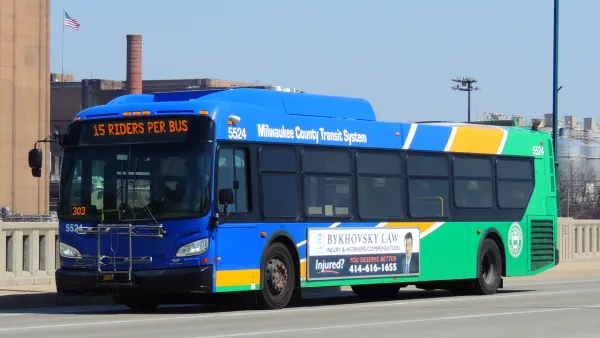New technology allows for more streamlined travel and fare capping for riders across the region.

The City of Waukesha’s transit system joined the Milwaukee County Transit System’s (MCTS) fare collection system, making it easier for residents to get around the region, reports Graham Kilmer in Urban Milwaukee. “The system’s riders have been able to pay their fares through WisGO since early June, but now Waukesha Metro is making the full switch to WisGo as their only fare collection app.”
The switch allows Waukesha Metro to take advantage of new technologies available in part due to Milwaukee’s bus rapid transit service, which “employs a number of technologies that are new for the transit system, including off-bus fare validators and real-time bus arrival signs.”
The system includes fare capping, which limits the amount charged for daily, weekly, and monthly use. “For example, a rider cannot spend more than $4 a day, $19.50 a week or $72 a month.”
FULL STORY: Waukesha Joins Milwaukee’s Transit Fare System

National Parks Layoffs Will Cause Communities to Lose Billions
Thousands of essential park workers were laid off this week, just before the busy spring break season.

Retro-silient?: America’s First “Eco-burb,” The Woodlands Turns 50
A master-planned community north of Houston offers lessons on green infrastructure and resilient design, but falls short of its founder’s lofty affordability and walkability goals.

Delivering for America Plan Will Downgrade Mail Service in at Least 49.5 Percent of Zip Codes
Republican and Democrat lawmakers criticize the plan for its disproportionate negative impact on rural communities.

Test News Post 1
This is a summary

Test News Headline 46
Test for the image on the front page.

Balancing Bombs and Butterflies: How the National Guard Protects a Rare Species
The National Guard at Fort Indiantown Gap uses GIS technology and land management strategies to balance military training with conservation efforts, ensuring the survival of the rare eastern regal fritillary butterfly.
Urban Design for Planners 1: Software Tools
This six-course series explores essential urban design concepts using open source software and equips planners with the tools they need to participate fully in the urban design process.
Planning for Universal Design
Learn the tools for implementing Universal Design in planning regulations.
EMC Planning Group, Inc.
Planetizen
Planetizen
Mpact (formerly Rail~Volution)
Great Falls Development Authority, Inc.
HUDs Office of Policy Development and Research
NYU Wagner Graduate School of Public Service





























